Last Updated on August 2, 2021

Read Part One of our DELIVER US FROM EVIL set visit report HERE.
In Part Two, we’ll take a look at some pertinent quotes from a few key members of the DELIVER US FROM EVIL team.

RALPH SARCHIE
”… it would have been more feasible to meet Satan face to face than to have this done.”
A horror movie, like a movie in any genre, isn’t effective if it doesn’t contain characters you’re invested in. Most of the memorable ones tell tales of regular, everyday people who are pounced upon by the sinister and unexplainable; their plights hit home for us because we too fear the chilling idea of our normalcy being shattered by things that go bump in the night. In the case of DELIVER US FROM EVIL, our protagonist is both an “everyman” and not quite that. He’s a cop, a man who devotes his existence to squaring off against the myriad cruelties life at its darkest has to offer – something most of us can’t relate to.
But Ralph Sarchie isn’t like most police officers. The real man, the man Eric Bana is portraying in this film, has apparently seen, heard and felt an unsettling number of horrific phenomena that even the most jaded cops can’t lay claim to. As documented in his book, “Beware the Night,” Sarchie would regularly come face-to-face with all manner of supernatural occurrences in his sixteen years as an NYPD detective: Demons, exorcisms, incubuses and unfriendly spirits were alive and well in the Big Apple, and Sarchie had fought against them. DELIVER US FROM EVIL doesn’t delve into every case; it’s something of an origin story, giving us a first-hand view of Sarchie’s progression from unbeliever to crusader against true evil, with certain elements from each case sprinkled in by Derrickson. Indeed, it would take a series of films to tell every one of Sarchie’s nightmarish cases, something that perhaps isn’t lost on producers Screen Gems and Jerry Bruckheimer.
During my visit to the set of DELIVER US FROM EVIL, right in the heart of the Bronx, where it all took place, my fellow set-visitors and I were able to spend some time with Sarchie, who is as intense and forthright as you’d expect a New York cop to be – especially one who has evidently been met with such macabre sights.
”The movie isn’t about a cop or the Devil, it’s about God,” Sarchie tells us as we huddle around him – fittingly – inside of a church. “There’s a spirituality. We have aspects of life we’re involved in but we really have no idea about the spiritual battle that rages around us that we are the subject of. The whole matter is the Devil tries to take souls away from God, and God tries to keep them. And that’s what this is all about.”
Sarchie is clearly a religious man, who at one time (and maybe still) envisioned himself as a person whose responsibility it is to combat evil. “I always believed in the spirit realm,” Sarchie says. “Whether or not I understood it or witnessed it or was involved in it. There wasn’t an incident that made be believe it was real, like I said I had an interest in it and as I grew older I realized that there are some people that are doing this for real. That’s when I realized this isn’t just a Hollywood thing. There’s an element of realism to it. I immersed myself more in the subject as a young adult. Then I started to get involved with a lot of people that were involved in it, and they would just bring me along basically. And I learned and decided that my Christian charity, what I wanted to do to serve God’s will, was to help people that were ensnared by the demonic.”
Regarding the surreality of having his life story translated to film, Sarchie seems to think it’s one of the more stranger things to happen to him. And that’s saying something. “You know, not too far from here I chased down a perp. And when I came to this location – just 10 years ago I was down the block over there wrestling this this perp – and now I’m over here filming this movie and I would have never even dreamed- it would have been more feasible to meet Satan face to face than to have this done. I would have expected that more than this. It was a shock. Like I said, it’s fun. It’s a great experience.”
As Sarchie has it, those familiar with the book shouldn’t necessarily expect the adaptation to be entirely “faithful”: “I would say that it’s more entertainment with elements of the book and my life. It’s not done in the context of what I wrote, but I recognize it. It’s gotta be entertaining. So there’s a lot of liberties.”
Sarchie is taking an active role in the behind-the-scenes aspect of the film, acting as an advisor and making sure the actors behave like real-deal officers of the law. Just don’t ask him if he wants to cameo. “I’d rather be on this side of the camera,” he says humbly. “I feel more comfortable. I’d rather keep myself centered and keep my ego as tepid as possible. Because you can get a big head walking around here. I feel that instead of putting myself out in that light, I’d rather be on this side of the camera just to make sure that the movie, from my perspective as far as police procedures, is done properly. I got my daughters in it, that’s good enough for me.”
Scott Derrickson can corroborate this: “He’s not having it, man. He just really doesn’t want to do it. I still have plans, though. You don’t get Ralph to do anything he doesn’t want to do, it’s really true.”

ERIC BANA
“You hang around with cops and all they do is put shit on each other.”
Certainly not afraid to be in front of the camera is one Eric Bana, Australian man’s man best known for turns in HULK, MUNICH and LONE SURVIVOR. DELIVER US FROM EVIL presents an interesting challenge for Bana, as the man he’s playing – Ralph Sarchie – is often on set watching him work. But the fact that this man and his experiences are inspiration for the film doesn’t change the way Bana does business. In fact, it was made clear to myself and the other journalists on set that the idea isn’t for Bana to do a straight-up impersonation; Sarchie is just a jumping off point.
”Scott wrote a really very character-filled script,” Bana says. “I mean, that’s why I signed on to do the film. That character was just so strong on the page. So he was really there. And I came out a couple of months before we started shooting. I got to meet Ralph and spent some time with him and just selfishly kind of cherry-picked what I felt would work well for the film. So I have stolen some bits and pieces and some elements, but it wasn’t entirely essential. He was just very giving in his time. There are certain elements to police at work in the 4-6 and in the Bronx. There’s a certain way about them that you can’t get away with not playing. So getting some time with those guys was really helpful.”
As mentioned earlier, the Sarchie that Bana is playing is not so inclined to believe in paranormal phenomenon. “Very skeptical… I liked that arc," Bana says. "Without giving too much away, certainly for a majority of the film, I’m playing the role of someone who is selling the supernatural to himself when he comes across it. It’s the beginning of that character’s journey. He’s just a 46th precinct, tough-as-hell cop… He has no pre-determined belief in the supernatural or anything like that.”
Lest you think this film will be one long morose descent into darkness, know this: Bana has a very significant comedic background, and he’s partnered up with Joel McHale. This means we can expect at least a glimmer of lightheartedness – or something close to it. Derrickson allowed his two detectives let-er-rip at least once during the production: “Because we're shooting digital there was one night where we were driving in that car and we had about 3 or 4 hours of shooting a long scene with dialogue,” explains Bana. “We got to 4am and we had another hour before the sun came up. We were in a process car in a trailer and the crew are all up the front on a truck. Because we didn't have to change mags we had about three camera guys on the front of the car, and Scott said, ‘Okay, we're just gonna roll. You guys just do whatever you want and put shit on each other.’ So Joel and I just went at each other for about 40-minutes straight without a script, so that was a lot of fun. We're both comfortable with that because of our backgrounds, and like I said if we were shooting on film we couldn't have done it.’”
According to Bana, that humor is all part of a cop’s daily existence, hence necessary to bringing some naturalism into the film. “You hang around with cops and all they do is put shit on each other. It's gallows humor all the way no matter what country you're in. For our characters to be believable it has to be there, otherwise it's two guys trying to act tough which is bullshit. I hear them every night when they come to the set and they're always telling stories, telling each other how fat they are, what a pussy they are. That's part of the job.”
Expect a gag reel on the Blu-ray, kids.
For Bana, being able to shoot in New York City is a major part of DELIVER’s appeal: “The first question I asked Scott when I met him was, ‘Tell me we’re not shooting this in Toronto, please?’” the actor says, echoing the sentiments of most everyone involved. “He said, “No, no. We are shooting this in the Bronx.” I was like, ‘OK. This is a great early actor-director conversation. I’m going to hold you to that.’ Because quite often these movies will end up going wherever it’s going to be best on paper and not best for the movie. In this case, the producers and the director were just right from the get-go (saying), ‘No, we’re shooting in the Bronx.’ And it’s absolutely essential cinematically. It doesn’t exactly let the production design department off the hook totally. They’ve had to work really hard as well. This is not you come to work and just chill. Every night it’s pretty full-on for the crew and we’re out on the street, at night. And it adds. There’s a certain level of tension amongst everyone without even thinking about it, every day we come to work, based on locations that really, I think, will help the film.”
And Sarchie’s book contains several more eerie incidents, Bana is aware that we may have not yet seen the last of the character. And he’s seemingly down to inhabit him a few more times. “There's a lot of room in Ralph Sarchie, most definitely,” Bana says after being asked about sequel possibilities. “He's a very interesting character, and a lot of fun to play. I haven't played many where I've thought, ‘Hmm, could be fun to do more of that guy.’”

SCOTT DERRICKSON
"It’s not a horror film. It’s just scary.”
Attempting to top SINISTER will be no easy feat for Scott Derrickson. The director, also known for THE EXORCISM OF EMILY ROSE and THE DAY THE EARTH TOOD STILL, raised the bar for dishing out night terrors as far as this writer is concerned, so his latest will have to be really on the ball if it wants to be in the same conversation. That said, Derrickson isn’t necessarily going for a similar vibe with DELIVER US FROM EVIL, which is indicative of the director’s interest in switching things up in his career.
“I almost hesitate to call it a horror film, to be honest,” Derrickson says. “It is such a character drama. In fact, commercially, and Jerry [Bruckheimer] would hate that I would compare it to this, but the only movie tonally I’ve been able to think of to compare it to is The Grey, a movie that is an action film, a horror film, a suspense film, but that’s really a drama, because it’s really about these characters in a suspenseful situation that gives way to these bursts of action. And in the end, that’s what interested me tonally about making the movie. It was trying to make something that wasn’t a down-the-center horror film, but at the same time was scary. In fact, Bob Shaw, our production designer who just did The Wolf of Wall Street, he made T-shirts for the art department, because I kept saying it to him, it says, “It’s not a horror film…but it’s scary.”
The way Derrickson became involved in the adaptation of Ralph Sarchie’s book, “Beware the Night,” is rather interesting. “Ralph Sarchie… is the guy who introduced me to Anneliese Michel, that became [Exorcism of Emily Rose]. I wrote the first draft of the script in 2004, and doing research here, I came to visit and I met Ralph, and he was still a cop in the 4-6. A very different guy than the guy you met; the guy you met now has kind of got a winsome manner. He was a very hardcore, angry guy back then, just working in the Bronx, all those guys seem like that, all those cops, you know? He was burned out and ready to retire. But he gave me the non-fiction book The Exorcism of Anneliese Michel, which was written by an anthropologist, that was out of print at the time.”
So Sarchie is responsible for two of Derrickson’s films. Keep that tidbit in your back pocket for trivia night. But before Derrickson came aboard, producer Jerry Bruckheimer had been trying to get “Beware the Night” made for over 15 years, enlisting writers such as Bryan Bertino (THE STRANGERS) and David Ayer (TRAINING DAY) to attempt to crack it. According to Derrickson, their work is still semi-present in the final shooting draft:
”So what I did then was I took all of the drafts, not just the different writers but all of the drafts from the different writers, so I had a stack of like, I think eight or nine drafts, and read them all. I read them all really carefully, and took from them a lot of ideas and then created a different structure for the movie. And that’s the movie that we’re making.”
Bruckheimer’s name might be the most unusual one attached to this project; the mega-producer best known for blockbusters in the $200 million range is obviously working on a smaller scale here. But as Derrickson tells it, his value in immeasurable.
“He contributes through his extraordinarily high taste when it comes to the technical aspects of filmmaking,” the director says of the producer. “He really knows how to identify a good DP. He really knows how to identify a great costume designer. So he really helped me crew up this movie in a way that taught me a lot, to be honest with you. And I asked him a lot of questions about why he likes the people he likes, and there were some people I liked and he didn’t want them. And I learned a lot from him. He’s a guy with decades of experience—not just experience, but experience at making a lot of great films. I think when he’s here on set, there’s a whole other thing that kicks in: the practicality of how he thinks about shooting and the tricks of the trade that he has.”
But the producer also obviously lets it be known when things aren’t to his liking: “I never have the feeling that he’s applying pressure for me to do anything differently than I would want to do it, except that he challenges me on the quality of certain things and says, ‘That can be better,’” Derrickson explains. “On more than one occasion, there have been things that I’ve been very happy with, and I’ve felt frustrated simply by him saying, ‘That can be better.’ And every time, he’s right.”
As mentioned in yesterday’s article, actually shooting in the Bronx has lent much to this production. Derrickson is fully aware of this: “…It’s so cinematic. The exteriors of the buildings are the obvious part, but the interiors of the Bronx, the hallways, the basements and the spaces that we’ve found, just these 150-year-old buildings with all these crevices and hallways and pipes… I’d go into places and I’d say, ‘You could look in LA for a year and you’d never find a space like this.’ So that became, for making a dark movie, tonally dark and visually dark, the Bronx just became a character—more than I was expecting, frankly. At first I just wanted to shoot here because Ralph lives here, and he’s the real guy, he’s our cop advisor on the movie and this was where it happened. It makes sense, and I got a lot more than I was expecting out of the space.”

JOEL McHALE
One of the people doing most of the legwork – literally – on the night of my visit to the set was Joel McHale, who sprinted multiple times after actor Chris Coy; the two spend a whole lot of time on the move, racing down the block time after time in order to get a chase sequence just right. McHale plays a tough-guy cop, while Coy is a member of a possessed squad of soldiers who are causing supernatural havoc in The Bronx.
On the surface, McHale might seem an odd choice for the role; he’s best known for his sardonic turns in “Community” and “The Soup” (which only requires him to be himself). But once you find out he’s best friends with director Scott Derrickson, it starts to make a bit more sense. Not that this was the only reason he nabbed the part of a hot-headed detective named Butler.
”Joel McHale’s character, I actually wrote for him,” Derrickson says. “Joel’s my best friend, so the Joel McHale in this movie is much more like the real Joel McHale than like the guy in The Soup and Community. Because I was having a hard time with the character, and I started thinking, ‘I’m gonna make him like Joel.’ And then I thought, ‘I’m gonna write him as Joel.’”
McHale clearly appreciates the opportunity to work with his friend. “He’s amazing,” he says about Derrickson. “I know you hear a lot of actors say things like that while they’re on set, it’s true though. He’s very light-hearted on set, which is great, which permeates the whole set, and he knows exactly what he wants. There’s no wavering. We’re not shooting endlessly because we’re trying to find something that’s going to appear from magic. He knows the things he wants and when he gets them he’s like, ‘Great, let’s move on.’”
So what kind of guy is Butler? Well, the fact that he wears a Boston Red Sox hat in The Bronx – tantamount to sacrilege – should give you a clue. “He just wears stuff to piss off other cops,” McHale says. That’s one way of going about things…
It’s also obvious that Butler is an intense fellow. He has tattoos of people he’s killed, and is obsessed with guns and knives. “He enjoys it, he is like a robot, kind of, but a fun-loving robot,” McHale says about the character, a former Army ranger who has evidently taken the lives of plenty of people. “He has some fear but he doesn’t really care about a lot of stuff, so he sees bodies and shootings and stabbings, he’s happy to joke and have a warm meal afterwards. Because the movie is pretty dark, there are definitely jokes in it, but I don’t want anybody to think for a second it’s a comedy.”
Not that McHale wasn’t sticking to his comedy roots when not filming DELIVER US. His normally L.A.-based show “The Soup” actually moved to New York in order to accommodate his schedule on the film. “I’ve been shooting that on Wednesdays, it takes about three hours, so thank god the “Soup” staff is incredibly efficient and they sent a couple people out here. We’re renting out the Rachel Ray studios. I get in at 11 and I’m usually done by 1:30 and then I come back here, so it’s incredibly convenient and ideal.”
Despite the double duty, McHale isn’t complaining. “I don’t have to swing a hammer. Believe me, so many people have a thousand times harder jobs, so I skip to work.

Thanks for taking the time to read our DELIVER US FROM EVIL set visit articles. If I were a betting man – and I am – I'd wager this film is going to make a gruesomely indelible impression on this summer.



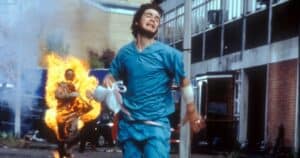


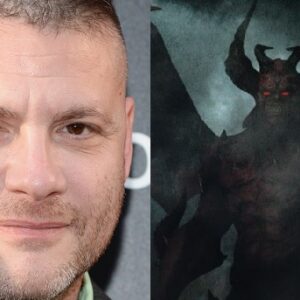
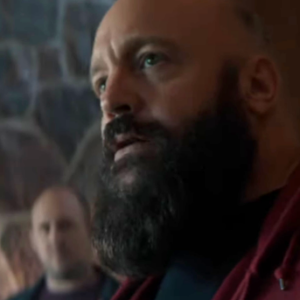
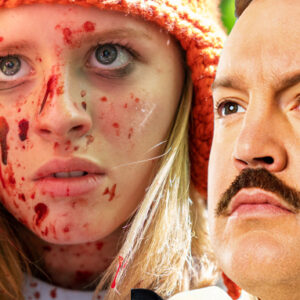


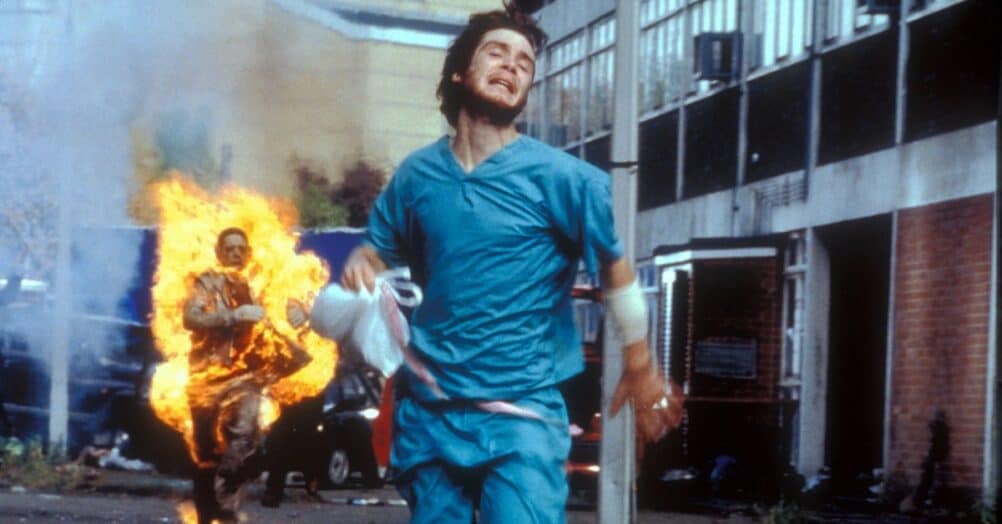





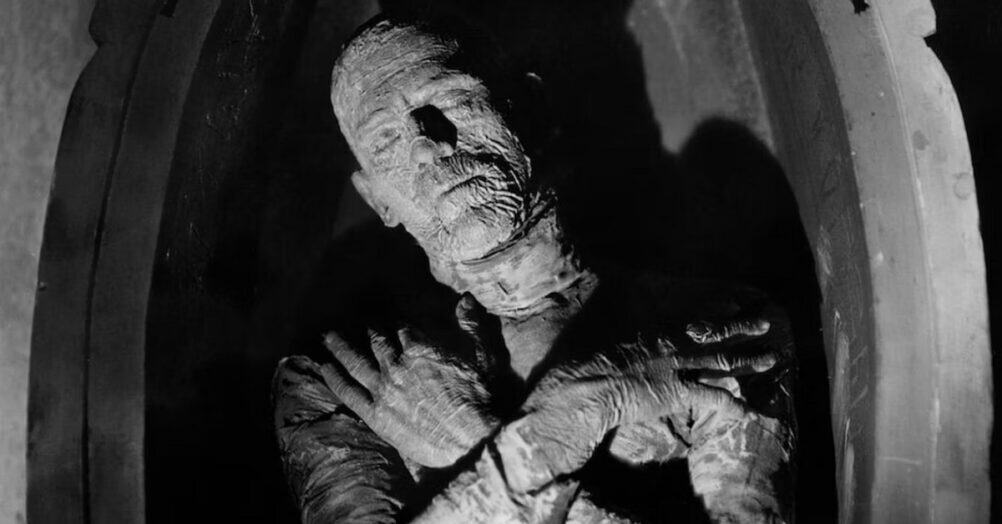
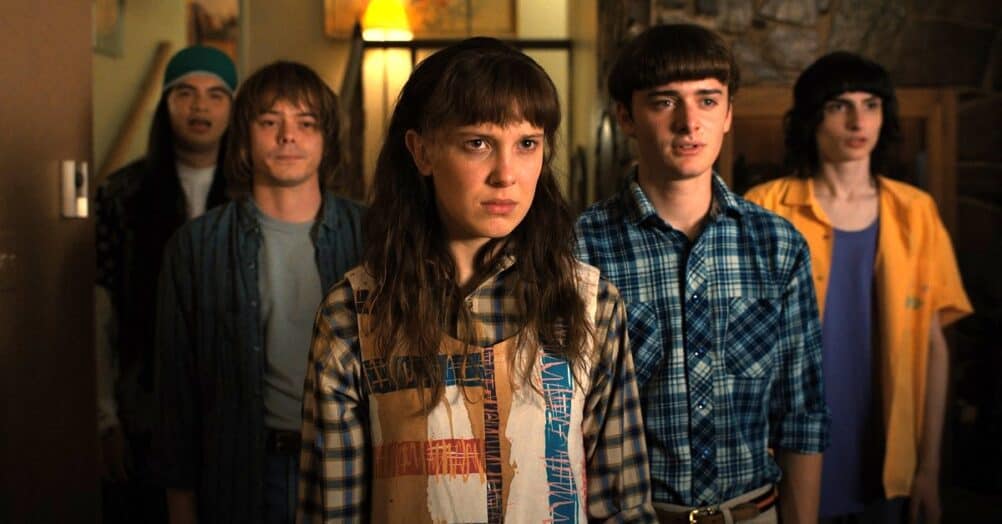

Follow the JOBLO MOVIE NETWORK
Follow us on YOUTUBE
Follow ARROW IN THE HEAD
Follow AITH on YOUTUBE